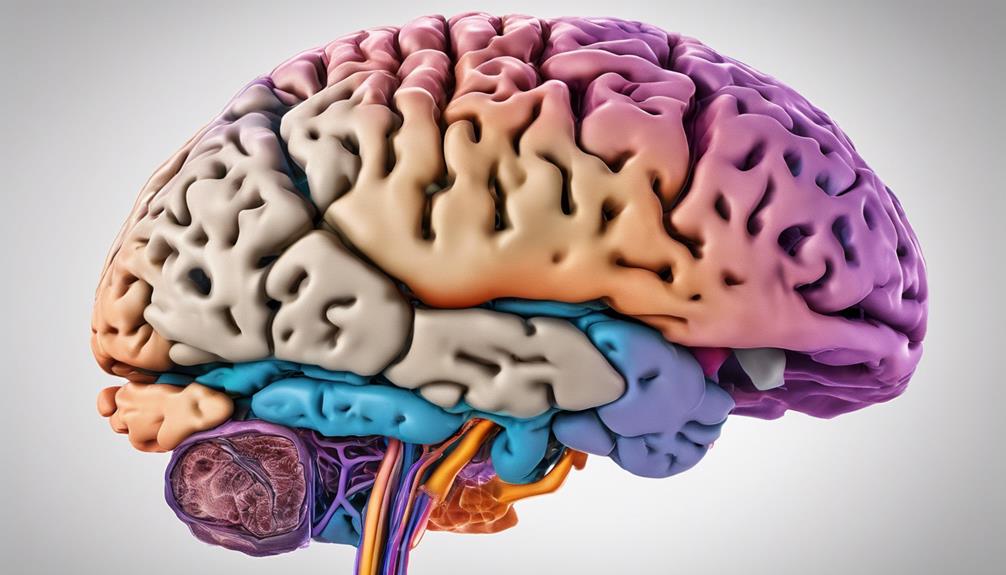Studying the complexities of the human brain, it is intriguing to explore the seemingly harmless habit of nose-picking and its potential connections to dementia.
The implications of this connection are both fascinating and concerning, hinting at a deeper relationship between seemingly mundane habits and complex neurological conditions.
By exploring the mechanisms through which nose picking could impact cognitive health, we may uncover surprising insights that could reshape our understanding of dementia risk factors.
Key Takeaways
- Nose picking may introduce bacteria like Chlamydia pneumoniae, potentially increasing dementia risk.
- Studies suggest a correlation between pathogens like C. pneumoniae and dementia.
- Preventing bacterial entry through the olfactory nerve could reduce Alzheimer's risk.
- Further human studies are crucial to establish a definitive connection.
The Link Between Nose Picking and Dementia
Nose picking has been implicated in potentially increasing the risk of developing dementia by introducing bacteria and contaminants into the nasal cavity. The presence of bacteria like Chlamydia pneumoniae in the nasal passages raises concerns about their potential to access the brain through the olfactory nerve, which could trigger the deposition of amyloid beta proteins associated with Alzheimer's disease.
Studies have highlighted a possible connection between pathogens such as C. pneumoniae and the development of dementia, emphasizing the significance of avoiding behaviors like nose-picking that could introduce harmful agents into the body. Research conducted on mice, where C. pneumoniae was injected, demonstrated an increase in bacteria within the olfactory brain region along with an abundance of genes related to Alzheimer's.
While these findings are compelling, definitive studies involving humans are necessary to establish a clear link between nose-picking, bacterial presence, and the risk of developing dementia.
Research Findings on Nose Picking and Dementia

Implicating potential risks associated with nose picking, recent research findings shed light on the connection between bacterial introduction through the nasal cavity and the development of dementia. The presence of bacteria like Chlamydia pneumoniae in the lining of the nose poses a significant concern, potentially increasing your risk of cognitive decline through pathways involving the nose to the brain. Understanding the implications of these research findings is crucial for public health and individual well-being.
- Research highlights the role of Chlamydia pneumoniae in reaching the brain through the olfactory nerve.
- Studies suggest a correlation between pathogens like C. pneumoniae and the onset of dementia.
- Infected mice exhibited higher levels of bacteria in the olfactory brain region and amyloid β protein clusters.
- Media coverage has drawn attention to the potential link between nose picking and dementia, emphasizing the need for further investigation in human studies to establish a definitive connection.
Potential Mechanisms Explaining the Connection
Exploring the potential mechanisms underlying the connection between nose picking and dementia reveals a critical pathway involving bacterial introduction through the olfactory nerve. When individuals engage in nose picking, they may inadvertently introduce bacteria, such as Chlamydia pneumoniae, into the nasal cavity. These bacteria can then travel through the olfactory nerve directly into the brain, bypassing the blood-brain barrier. Once in the brain, these pathogens have the potential to trigger the deposition of amyloid beta protein, a hallmark of late-onset Alzheimer's disease.
The olfactory nerve provides a direct route for pathogens from the nasal cavity to reach the brain, emphasizing how nose picking could increase how many bacteria enter the brain and potentially contribute to the development of dementia. Studies have suggested a link between pathogens like C. pneumoniae and the pathogenesis of dementia, highlighting the importance of avoiding behaviors like nose picking to reduce the risk of Alzheimer's disease. Preventing the entry of harmful bacteria into the brain through the olfactory nerve may be a crucial step in mitigating the risk of late-onset Alzheimer's disease.
Implications for Dementia Prevention Strategies

Considering the potential link between nose picking and the development of dementia, it's crucial to examine the implications for strategies aimed at preventing this cognitive decline. Nose-picking can introduce harmful bacteria into the nasal cavity, potentially leading to infections that could damage the lining and increase the risk of dementia. Understanding this connection can inform preventive measures to reduce the likelihood of cognitive impairment, particularly in individuals predisposed to Alzheimer's disease.
- Maintaining Nasal Hygiene: Regular cleaning of the nasal passages can help prevent the introduction of harmful pathogens that may contribute to dementia risk.
- Educating the Public: Raising awareness about the potential link between nasal hygiene and dementia can empower individuals to make informed choices regarding their health.
- Research and Development: Investing in studies to further explore the role of nasal bacteria in dementia development can help refine prevention strategies.
- Collaboration with Healthcare Providers: Working closely with medical professionals, such as those at Griffith University, can ensure that preventive measures are evidence-based and tailored to the specific needs of people at risk of Alzheimer's, the hallmark of dementia.
Future Directions for Study and Research
To further advance our understanding of the potential relationship between nose-picking, bacterial infiltration into the brain, and the risk of dementia, upcoming research endeavors will prioritize investigating these connections through human studies. Understanding the specific types of bacteria introduced through nose-picking and their impact on brain health could offer crucial insights for Alzheimer's prevention strategies. Examining the mechanisms by which pathogens travel from the nasal cavity to the brain in humans is essential for developing effective preventive measures against dementia. Additionally, exploring the role of the olfactory nerve as a pathway for bacterial access to the brain in the context of Alzheimer's disease may pave the way for targeted interventions.
| Future Research Directions | Key Focus Areas |
|---|---|
| Conducting human studies to explore the link between nose-picking and dementia risk | Picking your nose |
| Investigating the types of bacteria introduced through nose-picking and their impact on brain health | Common forms of bacteria |
| Understanding how pathogens travel from the nose to the brain in humans | Plucking hair |
| Replicating findings from mouse studies in human subjects to establish a clearer connection between bacterial infections and Alzheimer's development | Studies conducted in mice |
Frequently Asked Questions
Can Nose Picking Actually Increase the Risk of Developing Dementia?
We can't definitively link nose picking to an increased risk of dementia. However, research continually uncovers new connections between lifestyle habits and health outcomes.
While nose picking may not directly cause dementia, maintaining overall wellness through healthy habits can play a role in reducing the risk of cognitive decline.
It's essential to stay informed and adopt habits that promote brain health to support cognitive function as we age.
Are There Any Specific Types of Nose Picking Behaviors That Are More Strongly Linked to Dementia Risk?
When exploring specific types of nose picking behaviors linked to dementia risk, it's crucial to understand the broader context of cognitive health.
While certain habits may impact overall well-being, the direct correlation between particular nose picking actions and dementia risk remains a topic for further investigation.
How Does Nose Picking Impact Cognitive Function and Brain Health in Relation to Dementia?
When we consider the impact of nose picking on cognitive function and brain health in relation to dementia, it's essential to delve into the potential physiological repercussions of this behavior.
Nose picking can lead to physical harm, such as nasal infections or irritation. These conditions may not directly cause dementia, but they can contribute to overall health issues that may affect cognitive function over time.
It's crucial to maintain healthy habits for optimal brain health.
Are There Any Genetic Factors That May Influence the Connection Between Nose Picking and Dementia?
We haven't come across specific genetic factors that directly tie nose picking to dementia. However, genetic predispositions can influence various aspects of health and behavior.
When exploring connections between nose picking and dementia, it's crucial to consider the broader genetic landscape and how it may impact both behaviors and neurological conditions.
Research on this topic can shed light on any potential genetic influences that may play a role in this complex relationship.
Is There a Correlation Between Frequency of Nose Picking and Severity of Dementia Symptoms?
When considering the correlation between the frequency of nose picking and the severity of dementia symptoms, it's important to approach the topic with caution and thorough investigation.
Understanding any potential links between these two factors requires a comprehensive analysis of existing research and data.
Conclusion
In conclusion, the correlation between nose-picking and dementia is a compelling area of research that warrants further investigation.
While the exact mechanisms linking the two remain unclear, the potential risks associated with this habit can't be ignored.
As we strive to unravel the mysteries of Alzheimer's disease, it's imperative that we consider all possible factors, no matter how seemingly insignificant.
Let's heed the warning signs and take proactive measures to safeguard our cognitive health.









